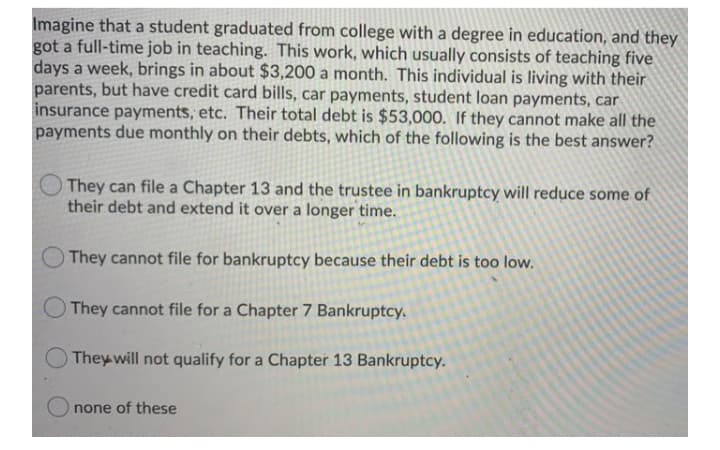Imagine that a student graduated from college with a degree in education, and they got a full-time job in teaching. This work, which usually consists of teaching five days a week, brings in about $3,200 a month. This individual is living with their parents, but have credit card bills, car payments, student loan payments, car insurance payments, etc. Their total debt is $53,000. If they cannot make all the payments due monthly on their debts, which of the following is the best answer? They can file a Chapter 13 and the trustee in bankruptcy will reduce some of their debt and extend it over a longer time. They cannot file for bankruptcy because their debt is too low. They cannot file for a Chapter 7 Bankruptcy. O They will not qualify for a Chapter 13 Bankruptcy. none of these
Imagine that a student graduated from college with a degree in education, and they got a full-time job in teaching. This work, which usually consists of teaching five days a week, brings in about $3,200 a month. This individual is living with their parents, but have credit card bills, car payments, student loan payments, car insurance payments, etc. Their total debt is $53,000. If they cannot make all the payments due monthly on their debts, which of the following is the best answer? They can file a Chapter 13 and the trustee in bankruptcy will reduce some of their debt and extend it over a longer time. They cannot file for bankruptcy because their debt is too low. They cannot file for a Chapter 7 Bankruptcy. O They will not qualify for a Chapter 13 Bankruptcy. none of these
Chapter6: Business Expenses
Section: Chapter Questions
Problem 69P
Related questions
Question

Transcribed Image Text:Imagine that a student graduated from college with a degree in education, and they
got a full-time job in teaching. This work, which usually consists of teaching five
days a week, brings in about $3,200 a month. This individual is living with their
parents, but have credit card bills, car payments, student loan payments, car
insurance payments, etc. Their total debt is $53,000. If they cannot make all the
payments due monthly on their debts, which of the following is the best answer?
They can file a Chapter 13 and the trustee in bankruptcy will reduce some of
their debt and extend it over a longer time.
They cannot file for bankruptcy because their debt is too low.
O They cannot file for a Chapter 7 Bankruptcy.
They will not qualify for a Chapter 13 Bankruptcy.
none of these
Expert Solution
This question has been solved!
Explore an expertly crafted, step-by-step solution for a thorough understanding of key concepts.
This is a popular solution!
Trending now
This is a popular solution!
Step by step
Solved in 2 steps

Knowledge Booster
Learn more about
Need a deep-dive on the concept behind this application? Look no further. Learn more about this topic, accounting and related others by exploring similar questions and additional content below.Recommended textbooks for you



Pfin (with Mindtap, 1 Term Printed Access Card) (…
Finance
ISBN:
9780357033609
Author:
Randall Billingsley, Lawrence J. Gitman, Michael D. Joehnk
Publisher:
Cengage Learning



Pfin (with Mindtap, 1 Term Printed Access Card) (…
Finance
ISBN:
9780357033609
Author:
Randall Billingsley, Lawrence J. Gitman, Michael D. Joehnk
Publisher:
Cengage Learning

Cornerstones of Cost Management (Cornerstones Ser…
Accounting
ISBN:
9781305970663
Author:
Don R. Hansen, Maryanne M. Mowen
Publisher:
Cengage Learning

Intermediate Financial Management (MindTap Course…
Finance
ISBN:
9781337395083
Author:
Eugene F. Brigham, Phillip R. Daves
Publisher:
Cengage Learning
